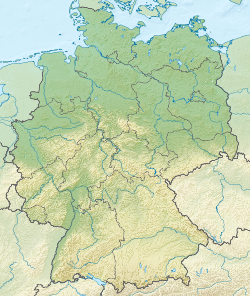Dessau-Wörlitz Garden Realm
 |
|
| UNESCO World Heritage Site | |
|---|---|
| Location |
Germany |
| Criteria | ii, iv |
| Reference | 534 |
| Coordinates | 51°51′49″N 12°16′53″E / 51.8636°N 12.2814°E |
| Inscription | 2000 (24th Session) |
|
[]
|
|
The Dessau-Wörlitz Garden Realm, also known as the English Grounds of Wörlitz, is one of the first and largest English parks in Germany and continental Europe. It was created in the late 18th century under the regency of Duke Leopold III of Anhalt-Dessau (1740-1817), returning from a Grand Tour to Italy, the Netherlands, England, France and Switzerland he had undertaken together with his friend architect Friedrich Wilhelm von Erdmannsdorff. Both strongly influenced by the ideals of The Enlightenment, they aimed to overcome the formal garden concept of the Baroque era in favour of a naturalistic landscape as they had seen at Stourhead Gardens and Ermenonville. Today the cultural landscape of Dessau-Wörlitz encompasses an area of 142 km2 (55 sq mi) within the Middle Elbe Biosphere Reserve in the German state of Saxony-Anhalt.
The Gardens had its origin in the 17th century, when the marriage of Leopold's great-grandfather Prince John George II of Anhalt-Dessau to the Dutch princess Henriette Catharina, daughter of Prince Frederick Henry of Orange (Dutch: Oranje), in 1659 brought a team of engineers and architects from the Low Countries under the supervision of architect Cornelis Ryckwaert to lay out the town, the palace and a Baroque garden in the former settlement of Nischwitz, which was renamed Oranienbaum in 1673. The Dutch influence remained prevalent in the Principality of Anhalt-Dessau for many decades.
...
Wikipedia

